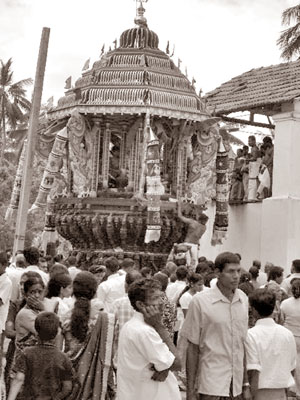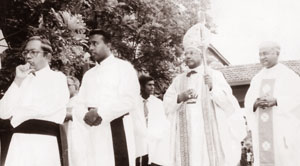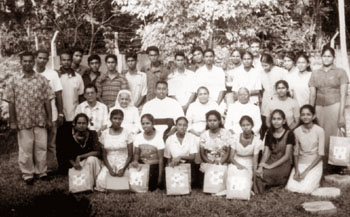
Powerful existence of a Super Being
EXISTENCE: Our thoughts are concentrated on the greatest name of
Almighty, and to most of the Muffassireens it is âIsmul Aalamâ namely
Allah. According to the dictionary of Islam the word Allah is used in
the Semito - Hemitic languages of Hebrew, Syrian, Arami, Sultani, Hamiri
and Arabic.
The word Allah connotes the powerful existence of a super being who
rules and protects His creations. The word Allah is mentioned in the
Sulthani language as âIlahiyaâ in Syrian, it is âAlahaâ, in Hebrew it is
âIlohaâ and in Arabic âIllahâ It is this âIllahâ which refers to Allah
in the First Kalima LA ILAHA ILLALLAH.
In his preface to Surathul Fathiha Maulana Abul Kalaam Azad says âMan
is astonished when he thinks of Allah. He accepts his weakness and
acknowledges the great power of Allahâ
Imam Abu Haniffa (Rah) in his book entitled âKiyasul Lugathâ writes,
âAllah is His unique name and it was not born from any language. In the
Holy Quran the name Allah is mentioned many a thousand times. His glory
and greatness is mentioned 2584 times in the Holy Quran.
In Surah âIkhlasâ the description of Allah is mentioned as thus: (Bismilla)
Kulhuwallau Ahad - Say He is Allah the one Alla Hus Samad - The self
sufficient master whom all creatures need (He neither eats nor drinks)
Lam Yalid Walam Uulad - He begets not nor was he begotten Walam Yakun
Lahu Kuffwan Ahad - There is none co equal or comparable with Him.
Allahâs nature is further described in the most famous verses of
âAyathul Qursiâ which begins as âAllahu La Ilaha Illahuwal Hayyul
Kaiyyumâ âHe is ever living the one who sustains and protects all that
exists. Neither slumber nor sleep over takes Him.
To Him belongs what ever is in the heavens and what ever in the
earth. Who is He who can intercede Him except with His permission. He
knows what happens to his creations in this world and what will happen
to them in the here after.
And they will never compass anything of His knowledge except that
which he wills. His âKursiâ extends over the heavens and the earth. And
He feels no fatigue in guarding and preserving them. And He is the Most
High, and the most great.
He has the power to create and to sustain by the words âKunâ âBeâ and
it âFayakoonâ and it will be.
In Surah âNoorâ Almighty Allah describes himself as âAllahu
Noorussamawathi Wal Arlâ - Allah is the light of heaven and earthâ Imam
Gazzali (Rah) in his book âAl Maqsadhul Asnaâ has given a detailed
description of Almighty Allahâs power, His position and His greatness.
His âQudrathâ (Power) âIlmâ (Knowledge) and âIradathâ (Orders) along
with his âBaseerâ (look), âSameeâ (hearing) and his hearing and âKalamâ
(Commandments)
J.M.B.H. Mahir
----------------------------
Religious freedom in ancient Sri Lanka
RELIGIOUS FREEDOM: The Mahavansa (the Great Dynasty), the national
chronicle states, the king Pandukhabaya, founder of Anuradhapuraya, the
capital of Rajarata, after his coronation had laid out the blue print
for the new capital, allocating premises for building a chapel (a place
of worship) for Kuban the god of wealth, another one for the sect called
yonas, yet another for various heretical sects and a monastery for
wandering mendicant monks. (The Mahavansa, Wilhelm Geiger).
Moreover, Cosmes Indico Pleustes, a Greek merchant had travelled in
the East between 520, A.D. and 525 A.D. and given a vivid account of his
travels and adventures. âThere has been a church of Persian Christians
in Taprobane, Greek name for Sri Lanka, with a Presbyter, elder in
authority, a Deacon, Minister, a body of believers and a group of
Christians. (Typographia Chritiani).
Further two crosses were excavated in 1913 in Anuradhapuraya, by the
archaeologists. According to H. W. Codrington they are identical with
the cross at Saint Thomasâ mount near Chennai, Madras.
Besides, the decoratived Baptismal font at the museum at Vavuniya,
according to Ven. Dr. Kanagratnam, belongs to the Eastern Christianity
of the early period. (Sunday Observer 19.07.1992)
Therefore, it is evident, there had been several beliefs, doctrines,
religious and philosophies during the kingdom of Rajarata and all the
divergent adherents had lived in amity, peacefully, and happily,
honouring each others convictions during Rajarata era.
The Mission of Fr. Joseph Vaz
Succeeding the Portuguese, the Dutch in 1658 proscribed Catholicism
promptly. The priests were expelled from churches and schools closed
down. However, some of the Catholics practised their religion secretly.
Hearing of the plight of the Catholics in Sri Lanka Fr. Joseph Vaz, a
Brahmin priest from Goa entered the Dutch province in Jaffna incognito
as a beggar and administered sacraments to the Catholics secretly.
Anyhow, the Dutch officials got the wind of his being in Jaffna and
tried to hound him out. On the sly Fr. Vaz left Jaffna for the Kandyan
Kingdom where there was absolute religious freedom.
King Vimaladharmasooriya realised Fr. Vaz was a harmless bona-fide
ascetic, consequently the king gave him complete freedom to exercise his
ministry and treated him with honour and respect.
His successor king Narendrasinha too treated Fr. Vaz with good wishes
and regards. Fr. Vaz could travel freely anywhere in the kingdom and
secretly on the suburbs. In the Historical Relations Robert Knox says
there had been several Portuguese priests, all refugees at Kandy.
Whenever the English prisoners wanted counsel or guidance they had
consulted the priests who had enlightened them and guarded them
legitimately. Further more, there had been Brahmin, Hindu and Muslim
priests, practising their faiths freely, unchallenged.
During the Kotte period Brahmins, the Chaplains to the king had their
own shrines, Pashndas, a kind of ascetics who blessed people and
predicted their future had places of worship. The message poems give
accounts of several Kovils that had blossomed in the Kotte kingdom; the
prominent and most popular Kovil was the Vibhishana devalaya, shrine at
Kelaniya.
Another devalaya dedicated to God Kataragama yet another to God
Iswara were in the capital while the shrine of goddess Kali was on the
suburb of Kotte. At a latter stage there had been a chapel at Etul Kotte,
put up by king Buvanekabahu for a group of Franciscan missionaries, next
to the kingâs palace.
Obviously, it is to the credit and honour of the Buddhist public that
there had not been any major religious conflict or antagonism anywhere
in Sri Lanka saving a sectarian clash during the British period in 1915.
The immense number of Kovilas, Devalayas, temples, mosques, wayside
shrines and churches all over the island speak eloquently of the
religious amity and harmony that has been prevalent from the primeval
days of the country.
L. V. Cabral
-------------------------
What is Hinduism
Continued from last Week
The Yoga and Rituals
|

A Chariot festival
|
These rishis, accordingly, prescribed certain methods and practices
for various persons according to their aptitude and spiritual
development. They felt that certain people were almost ready to get the
taste of Bliss.
They called them âadhikariâ, i.e. having ability and qualifications
to undertake and fulfill the ardent spiritual disciplines required to
realise the Transcendental Reality. Others needed some more time, for
their attachment to worldly concerns and senses was intense.
And therefore, these people needed or required to undertake certain
sacrifices before they became fit for realisation of the highest
knowledge. Thus, Yagna (sacrifices) came into existence.
From birth to death, in the ceremonies of marriage and childbirth, on
every family and social occasion, certain rituals were laid down that
helped in imparting certain measures of self-sacrifice (detachment from
bodily pleasures) and control of senses.
Thus, the Vedas were divided into two parts:
1) Karma-Kanda (ritual or ceremonial portion), and
2) Jnana-Kanda (knowledge portion - Upanishads).
The caste system
Unfortunately, this simple factual necessity and social reality was
usurped to their own benefit by higher caste Brahmins and unfortunately
that paved the way of caste system in medieval India.
Brahmins were respected for their knowledge of and authority over the
Vedas and the Upanishads; second in societal order were the Kshatriyas
(warrior caste); third were the Vaishyas (mercantile class) and the last
and unfortunate were the Shudras (lower caste).
The brahmins, instead of aspiring for realisation of Atman, started
to âteachâ the Vedas to other two castes - Kshatriya and Vaishya, and
prohibited Shudras from even listening to the Scriptures! They took over
themselves the sole custody of both the karma-kanda and the jnana-kanda,
and forced the shudras to serve the higher castes.
Shudras were thus victims of inhuman atrocities, and were denied
access to even secular knowledge - simple reading and writing. Thus,
like slaves, the shudras laboured and worked for the three higher
castes.
Gradually, over centuries, Kshatriya and Vaishya joined the league of
Brahmins to acquire and enjoy material prosperity and social status.
Thus Kshatriyas and the Vaishyas became important social force as the
kings and the merchants respectively. Brahmins found important positions
in royal courts as âperformers of ritualsâ, the priests.
This âjobâ was less arduous and taxing as compared to spiritual
practices meant for realisation of the Highest Truth, Brahman. Thus, the
Brahmins de facto became serving priests. They gave up their original
role as âseekers after Truthâ and were, instead, busy in seeking wealth
and position. This is the definition of decline of Dharma (religion).
Divine Incarnations (Men of God): The Avataras
When the path to self-realisation is forgotten in favour of hankering
after worldly pleasures, the Reality embodies itself as a Divine
Incarnation - Avatara - to guide the humankind regarding true religion,
and show true path towards the forgotten aim in life, to wit - Self
Realisation.
The spark of holiness, purity and divinity present in every human
heart coalesces to take a concrete shape as a divine person in every
religion, in all chimes and climes. Such great scientists of
spirituality show the path of further progress in human intellect and
evolution.
They are the embodiments of the aspirations of millions; aspirations
to manifest divinity within, aspiration to get liberated. Thus from time
to time, India saw incarnations of Men of God: Sri Rama, Sri Krishna,
Bhagavan Mahavir, Shankaracharya, Guru Nanak, Sri Ramakrishna, and many
others.
Influenced by their teachings, Dharma or religion or spirituality
still survives in India, although appearing at times in its distorted
form. (Internet).
--------------------
Savan Piyasa to give deaf their rightful place
|

Colombo Archbishop Rt. Rev. Dr. Oswald Gomis being taken to the
venue âSavan Piyasaâ for blessing.
|
HELP TO NEEDY: Savan Piyasa in Enderamulla opened on November 1, 2005
by Archbishop Rt. Rev. Dr. Oswald Gomis is an institution set up for the
benefit of the deaf and Rev. Fr. Sudath Jayalal Silva has been appointed
in charge of the Institute.
This Institution serves as the Mother House for those receiving
training to help the deaf who come under them at a number of houses
catering to their needs.
Savan Piyasa is for education to give the deaf their ârightful
placeâ, help them to learn for a living without being a burden to the
society and provide them nourishing food as they are also destitute.
Former Archbishop of Colombo Rt. Rev. Dr. Nicholas Marcus Fernando
asked Fr. Silva to take up the challenge of the new mission to the deaf
and on His Lordshipâs instructions he learnt the`sign languageâ in quick
time, a must to communicate with the deaf who come seeking assistance
both material and spiritual needs.
|

The Inmates of the Savan Piyasa with Head of the Institute Rev. Fr.
Sudath Jayalath Silva.
|
Having understood what the new `Missionâ demands from him, Fr. Silva
began working visiting several Houses assigned for the deaf and he found
it to be very beneficial to the deaf, to the society at large and has
dedicated his life for the well-being of the deaf.
During the five years rendering services as the administrator of the
Institute, he had shown his capacity to work and as he was also
interested to be of service to similar institutions in other part of the
country, he had extended his services to institutions looking after the
deaf in Weralugama, Moratuwa, Colombo and Ragama.
Fr. Silva is also committed to teach the children to learn, to speak
and thus winning the deficiency, the biggest complication to enter the
society.
In the long drawn programme Fr. Silva has included a pre-school, and
Vocational Training Centre where these deaf children would learn picture
framing, tailoring and ornamental work. The Institute hopes to have the
support of both local and foreign donors to take these projects forward.
Padmini Nanayakkara
------------------------------
Rules of observance of supplications
* Supplication must be performed with faith and sincerity.
* It must be fully tried to keep away from Sins. Food drink and
clothes must be avialble from legitimate (Hala) earnings.
* One must specially refrain from major sins such as adultery, wine,
falsehood, cheating, jealousy, pride, ill-will, back - biting and tale
carrying.
* Supplication must be performed with utmost humility and fear to God
causing shedding of tears.
* Confessing the commission of sins, to express repentance with
sincerity of heart.
* It is desirable that before supplication (Duâa) one must perform
ablution (Wudu) and then pray two Rakaath Namaz (Nafil).
* It would be preferable to face Qibla for supplication.
* While supplication, both the hands must be raised and both the
palms be kept before the face.
* Invocation and Isthigh far (asking forgiveness for sins) must be
repeated thrice.
* There can be no supplication for facilitating commission of sins
and cutting of relations.
* In apparent appearance if the Supplication is not fulfilled then it
must be thought that there is some inherent goodness in its non -
acceptance. Perhaps Allah will fulfil my supplication in some other
form, the reward of supplication is nevertheless not lost upon me.
Zahrina Careem Ayesha Siddeqa E.I.
---------------------------
From A to Z
A - Abide by the values of the Gospel.
B - Born free, live free with dignity.
C - Celebrate life and its blessings.
D - Decide what you want to get and get what you decide.
E - Experience is your best teacher.
F - Friends lighten your burdens of life.
G - Goosip leaves a trail of character assassination.
H - Hope keeps your dreams alive.
I - In times of decision, rely on your gut instincts.
J - Join hands and experience strength in fellowship.
K - Knock at every door of opportunity.
L - Listening is an art and listening to the Divine is a grace.
M - Memories are like roses that bloom in the garden of tomorrow.
N - Never say âNOâ to anyone in need.
O - Open your eyes to the wonders of creation.
P - Possibilities are opportunities to be explored.
Q - Quiet moments renew our energy.
R - Rely on Godâs promises.
S - Seek the truth with passion and speak the truth in love.
T - Turn your scars into stars.
U - Understand your limits and never cross your boundaries.
V - Visualize your dreams and make your dreams come alive.
W - When provoked to anger learn to be patient.
X - Zip your lips when others annoy you.
Y - You count and you can make a difference.
Z - Zero in on your priorities.
Rev. Fr. George B. Perera
|

